Class of 2020
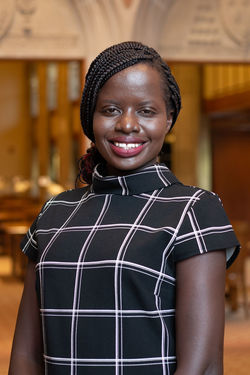
Sharon Adongo (Kenya)
Sharon Adongo is a human rights lawyer with experience in women’s advocacy and rule of law issues, having begun her career as a student intern at the Federation of Women Lawyers Kenya. She obtained her LL.B. degree from Moi University School of Law in 2014 and is admitted to practice Law at the Kenyan Bar. Since 2017, she has been working with Lawyers Without Borders and with the Kenyan Office of the Director of Public Prosecutions on various trial advocacy trainings aimed at improving the capacity of Kenyan prosecutors. She is passionate about the topic of good governance in Africa and around the world, and loves to write short stories on human rights issues that societies face. In 2018, her short story “Achola the Good Wife” was selected as a finalist in the African Book Club Short Story Competition.
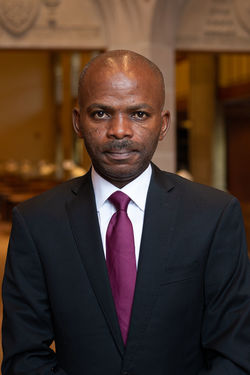
Jespa Ajereboh Tichock (Cameroon)
Jespa Ajereboh Tichock trained in the Nigerian Law School and is a member of the Cameroon and Nigerian Bar Associations. He holds a bachelor’s degree in geography, a post-graduate diploma in political science, a bachelor’s degree in law, and a post-graduate diploma in law from the Universities of Yaounde I and II in Cameroon. Ajereboh is a summer attendee of The Hague Academy of International Law in The Hague, Netherlands, and the Salzburg Summer Law School on International Criminal Law, Humanitarian Law, and Human Rights Law in Austria. He is also an international elections expert, affiliated with the African Union Commission (AUC), The Carter Center and the National Democratic Institute for International Affairs (NDI). For the past 12 years, he has participated in international election observation missions in Nigeria (2007, 2011, 2015), Ghana (2008), Myanmar (2015), Somalia (2016), Kenya (2017), Liberia (2017), Sierra Leone (2018) and Malawi (2019), working with electoral stakeholders on best practices to advance democracy and human rights. Ajereboh is interested in the implications of human rights issues for elections, democracy, peace and security, good governance, the rule of law, self-determination, terrorism, and development.
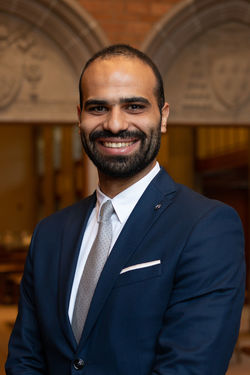
Maged Arisha (Egypt)
Maged Arisha earned his bachelor’s degree in law from Menofia University (Egypt) in 2012. After graduation, he worked with national and international NGOs in Egypt focusing on youth empowerment. In 2015, he joined the United Nations High Commissioner for Refugees (UNHCR) in Egypt as an Eligibility Officer. He adjudicated asylum claims from different countries in the region, identifying their protection concerns and recommending a legal decision on their eligibility under the 1951 Refugee Convention. He was later appointed as a Reviewing Officer with the main task of reviewing and endorsing the recommendations on such asylum claims. Arisha is interested in deepening his knowledge about the field to better advocate for human rights practices in the region and to be more reflective about how to establish systems that respond to human rights violations.
He is the recipient of a scholarship from the prestigious Fulbright Foreign Student Program 2019-2020.
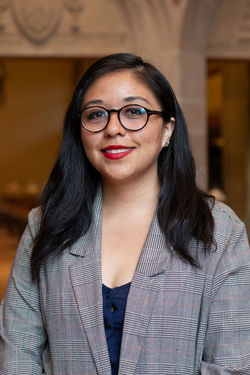
Nancy Bautista Segundo (Mexico)
Nancy Bautista obtained her law degree from Universidad Nacional Autónoma de México (UNAM) in 2018. During her studies, she was as a Research Assistant at the Institute for Legal Research and a member of the university’s human rights clinic. She holds a diploma in gender, sexuality, and the law and a diploma in strategic human rights litigation. In 2016, Bautista interned at the Center for Justice and International Law (CEJIL) in San Jose, Costa Rica, where she focused on gender cases before Inter-American Court of Human Rights. She also completed a professional visit at the Inter-American Court of Human Rights, assisting in the drafting of a judgment involving transitional justice. In 2017, she worked as a law clerk in Mexico’s Supreme Court of Justice. Following her clerkship, Bautista worked at the National Victims Commission, where she was in charge of legal representation for human rights victims and coordinated cases before the Inter-American system of human rights. Since 2019, she has worked at the National Search Commission for Missing Persons in Mexico.
Bautista is a 2019-2020 Riley Scholar at Notre Dame.
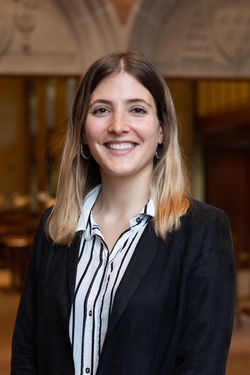
Mariana Brocca (Argentina)
Mariana Brocca obtained her law degree from the Universidad Nacional del Centro de la Provincia de Buenos Aires in 2017. While in law school, she participated in multiple human rights moot courts, including the Inter-American Human Rights Moot Court Competition (American University). In 2018, she worked, first as a legal intern and then as a legal consultant, at the Center for Justice and International Law (CEJIL), where she collaborated on strategic litigation before the Inter-American Human Rights System. Brocca is also a researcher at the Center for Human Rights Studies and a Junior Lecturer for the course “Human Rights and Guarantees” at her alma mater.
She is the recipient of a scholarship from the prestigious Fulbright Foreign Student Program 2019-2020.

María Elizondo (Mexico)
María Elizondo received her law degree from the University of Monterrey in 2017, graduating magna cum laude. She represented her university at the Inter-American Human Rights Moot Court and Sergio García Ramírez competitions. During law school, she volunteered at Nuevo León's Human Rights Commission and then served at the NGO Documenta working with people with disabilities in the criminal justice system. Afterward, she worked as a legal intern with Renace, improving the penitentiary system. Elizondo volunteered at and coordinated the Young Altruists Thinking program in Mexico, where she offered legal aid to disadvantaged communities and served as a volunteer high school teacher. Before coming to Notre Dame, Elizondo worked at Ciudadanos en Apoyo a los Derechos Humanos (CADHAC) accompanying families and victims of enforced disappearance and other gross human rights violations in Nuevo León and Tamaulipas.
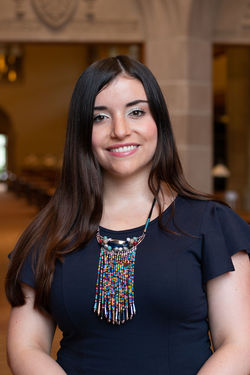
Angie García (Colombia)
Angie García earned her law degree from Universidad de Medellín in 2016. While in law school, she enrolled in the research group and legal clinic on public international law and human rights. After graduation, she worked at Inter-American Court of Human Rights as a visiting professional. From 2017 to 2019, García served as a legal advisor at Foundation for Press Freedom (FLIP) in Colombia, where she litigated cases related to gross violations of human rights against journalists before domestic courts and the Inter-American Human Rights System. Most recently, she worked with the District Government of Bogotá as a women's rights advocate. García is a member of the Ibero-American Perspectives on Justice research network, coordinated by the Ibero-American Institute of The Hague for Peace, Human Rights and International Justice (IIDH).
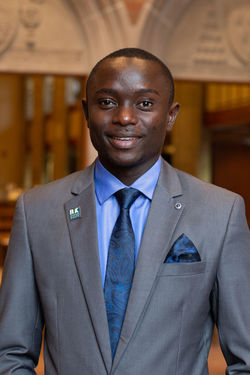
Pontus Joseph Pog Njenom (Cameroon)
Pontus Joseph Pog Njenom obtained his LL.B. degree from the University of Buea in Cameroon in 2013, where he received the Barrister Nico Halle and Edmund Wellegy awards for the most outstanding student in the law department. He later obtained his LL.M. in international law from the same university in 2016, graduating with First Class Honors and the overall best student award in the Faculty of Laws and Political Science. Since this time, he has served as a Human Rights Officer with the Center for Human Rights and Democracy in Africa (CHRDA). He also heads the Humanitarian Department of his office, working closely with internally displaced persons and victims of human rights violations in Cameroon.
Njenom is a 2019-2020 Riley Scholar at Notre Dame.
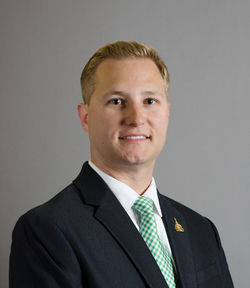
Jonathan Hannah (United States)
Jonathan Hannah is the Program Director for Notre Dame Law School's Program on Church, State & Society. He is also currently a professional specialist in the political science department where he teaches a course on philanthropy and the common good. Hannah previously worked as a policy analyst in Washington, D.C., and has been an instructor at the Lewis University College of Business. He holds a bachelor’s degree from Saint Xavier University, a master’s degree from Lewis University, and a juris doctor from the University of Detroit Mercy. He was a Fulbright scholar in 2015 and participated in an International Education Administrator program in Germany.
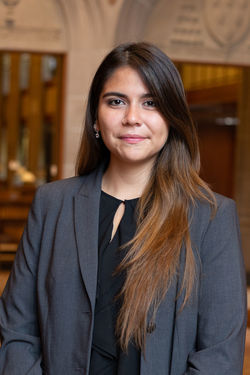
Carmen Haydeé López (Honduras)
Carmen López obtained her law degree from the University of San Pedro Sula, Honduras. Her interest in fighting violence and forced migration in Honduras began with the military coup in 2009. Since then, she has been involved in the training and promotion of human rights in NGOs, social movements and international institutions. Between 2011-2015 she was a co-founder of human right’s education initiatives for young women and led the National Assembly of Feminist Women in 2015. López completed a CEDAW for Change international course at the University for Peace in Costa Rica. In 2016, she presented civil society’s alternative report at the CEDAW Committee’s 65th Session in Geneva. Most recently, López has worked as a legal advisor at Fundación para la Justicia y el Estado Democrático de Derecho, accompanying families of Honduran migrants who have been executed or who have disappeared.
López is a 2019-2020 Rita Bahr Scholar.
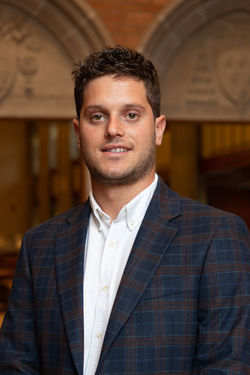
Carlos Marcos Cremades (Spain)
Carlos Marcos Cremades obtained his law degree in 2014 and subsequently a Double Master of Laws in Legal Practice and International Law in 2015 from ESADE Law School (Barcelona, Spain). During the LL.B., he took part in the exchange program of Georgetown University's Center for Transnational Legal Studies in London, United Kingdom. At both the graduate and postgraduate levels, he focused his studies on international law, criminal law, and human rights. Upon completion of his university studies, he started his professional career in Dubai (UAE) working as an associate in a regional law firm for almost three years. In 2018, he interned at the United Nations Office Against Drugs and Crimes and worked as a visiting professional at the Inter-American Court of Human Rights in San Jose, Costa Rica. He is particularly interested in the intersection of international human rights law, humanitarian law, and criminal law.
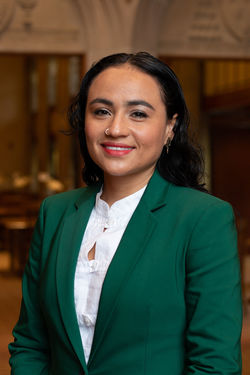
Leslie Mendez (Belize)
Leslie D. Mendez obtained her law degree from the University of the West Indies in Barbados in 2011 and her Certificate of Legal Education from the Norman Manley Law School in Jamaica. While at Norman Manley Law School, Mendez participated in the World Human Rights Moot Court Competition in South Africa, where she and her team placed first in both 2012 and 2013. Since graduating, Mendez has focused on public interest litigation on various constitutional and administrative matters before the courts in Belize. In particular, she has worked on prisoner rights, refugee and migrant rights, and the right to non-discrimination, among others. Mendez served as a Fellow at the Inter-American Commission on Human Rights, having been awarded the Fellowship for Attorneys from the English-Speaking Caribbean. More recently, she has been appointed to the Bi-Partisan Committee on the International Court of Justice on the Belize/Guatemala territorial dispute. She is also the Vice-President of the Bar Association of Belize.
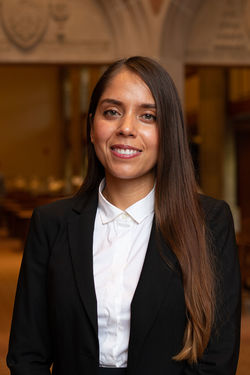
Isabel Anayanssi Orizaga Inzunza (Mexico)
Isabel Anayanssi Orizaga Inzunza obtained her law degree from the Autonomous University of Baja California in 2014, where she received an award for academic excellence. She also received the Youth Award for academic performance, given by the Governor of Baja California. Orizaga was a Visiting Professional at the Inter- American Court of Human Rights in 2014. From 2015 to 2017, Orizaga worked as a researcher assistant for Judge Eduardo Ferrer Mac-Gregor Poisot in the Institute of Legal Research of the Universidad Nacional Autónoma de México. During that time, she researched international standards regarding violence against women, as well as forced disappearances. Most recently, Orizaga worked as a staff lawyer at Mexico’s National Human Rights Commission. She is co-author of the International Bar Association Human Rights Institute’s study on forcibly disappeared persons.
Orizaga is a 2019-2020 Rita Bahr Scholar.
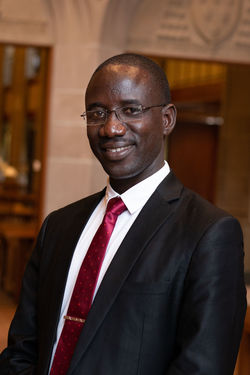
Abdulaziz Osman (Sudan)
Abdulaziz Osman earned a degree in Business Administration with honors in 2008 and an LL.B. in 2012 from University of Neelain in Khartoum, Sudan. Since December 2014, he has held the Bar Association’s license to practice as a lawyer in Sudan. From 2016-2018, Osman worked as a Human Rights Officer with the United Nations African Union Mission in Darfur (UNAMID), in Zalingei, Central Darfur State, Sudan. In this role, he developed a high degree of expertise in research and monitoring human rights issues; collection and analysis of human rights indicators; capacity building in human rights; mainstreaming of human rights and gender into political and economic programs; and integration of gender perspectives, with special attention to the rights of women and the girl child. Osman has also worked as a human rights lawyer with the Darfur Bar Association to provide legal assistance to the victims of human rights violations, as well as to advocate for the rule of law, good governance, and democracy in Sudan. Immediately prior to attending Notre Dame, he began work as a Gender Based Violence Officer with the United Nations Population Fund (UNPFA) in El Daen, East Darfur State, Sudan.
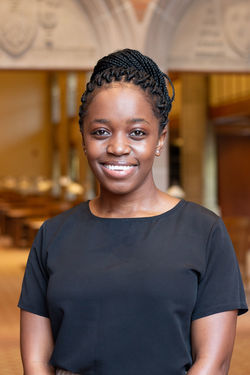
Simphiwe Sidu (South Africa)
Simphiwe Sidu obtained her law degree from the University of KwaZulu-Natal in 2015. Since graduation, she worked at the South African Human Rights Commission as a compliance officer in the right of access to information unit. In 2017, she clerked at the Supreme Court of Appeal, South Africa for all the Justices of the Court. In March 2018, Sidu joined the International Commission of Jurists where she was responsible for the promotion and protection of civic space and human rights defenders in Southern Africa, and coordinated the incubation and establishment of the Southern Africa Human Rights Defenders Network (SAHRDN) as a functioning network for security and protection of HRDs in Southern Africa. She has successfully coordinated fact finding and trial observation missions and collaborated with human rights defenders to push back on “weaponization” of the law in Southern Africa.
Sidu is the 2019-2020 recipient of the Ismail Mohamed Scholarship from the Constitutional Court of South Africa.
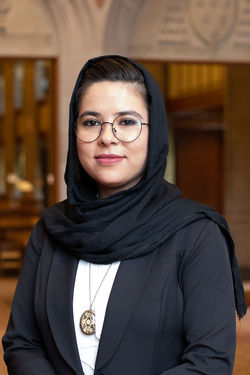
Tahmina Sobat (Afghanistan)
Tahmina Sobat earned her law degree from Herat University in Afghanistan in 2015. During her studies, she interned in the Legal Clinic at Herat University, completed Global Right’s Young Lawyers-in-Training Program, and conducted research to evaluate student knowledge regarding Afghanistan’s governmental structure and constitutional law. She also participated in Women Leadership Development (WLD) and wrote a monograph titled “Criminalization of Telephone Harassment in Afghanistan’s Legal System.” After graduation, she started her career at the Afghanistan Independent Human Rights Commission (AIHRC), serving three years as an Ombudsman’s Assistant. Her responsibilities included monitoring and investigating human rights and international humanitarian law violations.
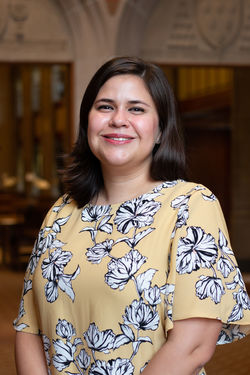
María Treviño Salce (Mexico)
María Treviño Salce earned her law degree from the Instituto Tecnológico de Estudios Superiores de Monterrey. She worked as a law clerk at the Federal Court of Administrative Justice and after, as a legal intern at the Inter-American Court of Human Rights. Prior to Notre Dame, Treviño worked at the State of Nuevo León’s Human Rights Commission, where she investigated and resolved complaints and disagreements about alleged human rights violations committed by authorities at the state level. Her passion for women’s rights led her to volunteer in an orphanage in Kenya, where she focused her work on helping women and girls in the community. She has also volunteered at Alternativas Pacíficas, an NGO that helps to eradicate violence against women in Mexico.
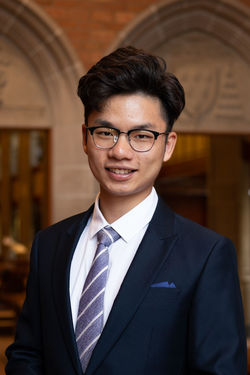
Zixu Wang (China)
Zixu Wang earned his LL.B. degree from Shandong University in 2019, where he focused on freedom of expression and developed his passion for journalism. In 2019, the buddy program at his university was distorted by some media outlets as “Chinese girls serve foreign students.” His pioneering journalistic report on the program was the first to highlight cyber-violence and harassment and fought back against women’s stigmatization. The article was viewed more than 50 million times on the internet. In 2018, as an intern journalist with RenWu, his report “Fujian Carbon 9 Leaking Event” compelled local government officials to accept responsibility for environmental damage. Wang’s interest in LGBT equality sparked his leadership of the “5/17 International Day Against Homophobia” campaign at his university.
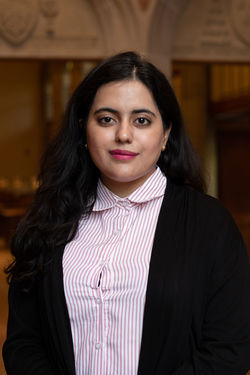
Noor Zafar (Pakistan)
Noor Zafar completed her law degree at the Sheikh Ahmed Hassan School of Law at the Lahore University of Management Sciences in Pakistan. During law school, she worked with the AGHS legal aid clinic to provide free legal assistance to those in need and Justice Project Pakistan to abolish the death penalty in Pakistan. She also took part in two legal clinics sponsored by the American Bar Association to spread awareness regarding human rights and focused her research on laws against rape and harassment in Pakistan. After graduating in 2018, she worked with a criminal defense lawyer in these areas.
Zafar is a 2019-2020 Riley Scholar at Notre Dame.
Publications:
- The Plight of a Rape Survivor, 9 PLR 95 (2018). Research paper on rape cases in Pakistan, published in Pakistan Law Review in 2018.
- Book Review of Adjudicating Family Law in Muslim Courts, 3 LUMS (2016).